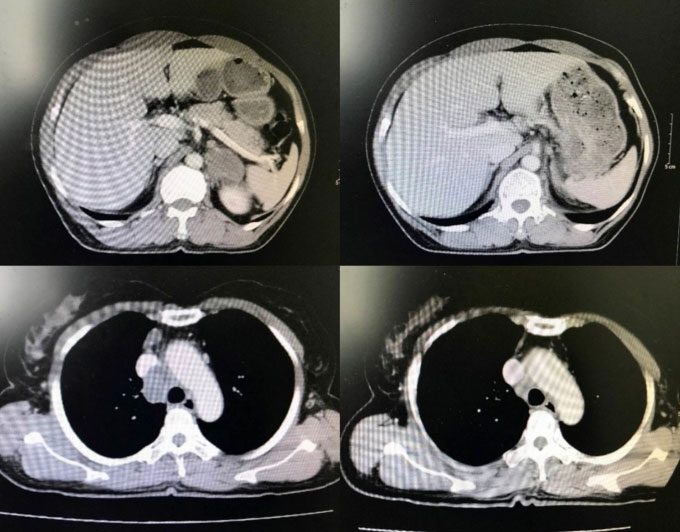Through immunotherapy, a 57-year-old woman with late-stage lung cancer has achieved remission after just three treatment cycles, with her tumors disappearing.
According to Dr. Pham Tuan Anh, Deputy Head of the Department of Specialized Treatment at K Central Hospital, this is one of the remarkable cases of survival at the hospital.
The woman, who prefers to remain unnamed, had a healthy medical history. By the end of 2019, she felt lymph nodes swelling in both supraclavicular areas but did not experience shortness of breath or weight loss. Doctors found a lymph node measuring 4 cm, with no abnormalities detected in other areas.
A biopsy of the supraclavicular lymph node revealed metastatic adenocarcinoma from the lungs at an advanced stage. Understanding the severity of her illness, the woman felt devastated. “I often thought about death and was deeply pained by the thought of leaving my family, husband, and children,” she shared.
Lung cancer is the most common cancer in terms of both incidence and mortality rates. In Vietnam, lung cancer ranks second after liver cancer, with approximately 23,600 new cases diagnosed and 20,700 deaths each year.
At that time, the woman’s lung cancer had progressed significantly. Computed tomography (CT) scans revealed a tumor in her left lung measuring 20 mm, with metastasis to the supraclavicular lymph nodes and mediastinal lymph nodes, as well as adrenal gland metastasis.
Doctors assessed her survival chances as low and recommended a final treatment approach using immunotherapy combined with chemotherapy and the immunotherapy drug pembrolizumab – a medication that activates the body’s immune cells to fight the tumor.
After three cycles, the patient tolerated the medication well. Follow-up CT scans showed a good response with tumor lesions, mediastinal lymph nodes, and adrenal lesions reducing by 70% in size, with tumors disappearing. The patient continued with three more cycles of treatment and is currently in remission.

From left to right, top to bottom are images of the tumor at diagnosis and after three cycles of treatment. (Photo: Provided by the doctor)
Immunotherapy is considered one of the breakthroughs in cancer treatment over the past decade. In Vietnam, this therapy has been applied for about five years; however, the barrier is the high cost. Treatment costs can reach hundreds of millions to billions of VND, with patients receiving partial coverage from health insurance.
Associate Professor Dr. Pham Van Binh, Deputy Director of K Hospital, explained that immunotherapy activates the immune system to attack cancer cells. There are two types of immunotherapy: one uses targeted drugs to activate immune cells capable of combating tumors, and the other extracts immune cells from the patient’s body, modifies them to recognize cancer cells, and then reinfuses them to destroy the tumor. A representative example of this group of therapies is CAR-T cell therapy for hematological cancers.
Depending on the type of cancer, immunotherapy has different response rates. For lung cancer, doctors conducted research on 123 patients in each group, comparing those treated with immunotherapy and those who received no treatment, with an average follow-up period of 23.9 months. The overall response rate was 56.7% for the immunotherapy group, while the chemotherapy-only group had a response rate of 30.2%.
The aforementioned patient responded well to the immunotherapy drug pembrolizumab. After three treatment cycles, results showed complete tumor disappearance. “I never thought I could continue living. This is truly miraculous,” the woman shared.
Studies show that nearly all patients who respond to immunotherapy do not experience cancer recurrence. However, enhancing the immune system can also lead to hypersensitivity and increased inflammatory responses in the body. These side effects vary depending on the type of cancer, the medication used, the dosage, and the administration method.
“In some cases, side effects are only 15-30%, but in others, they can reach up to 90%, depending on the severity,” said Dr. Binh, noting that the toxicities are manageable and can be controlled with close monitoring and appropriate treatment. Immunotherapy’s effectiveness remains part of a multi-modal treatment approach, meaning it must be combined with chemotherapy, radiation therapy, and surgery; “it cannot be separated or glorified as a standalone method.”


















































